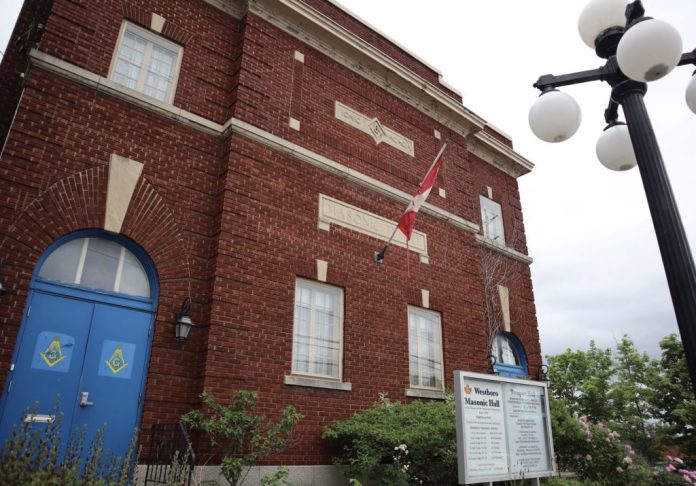Westboros’s century-old Masonic Hall was one of five buildings the city’s Built Heritage Committee gave the stamp of approval to save on Jan. 16.
Built in 1924, city staff argued it’s a “representative example of a purpose-built Masonic Temple, featuring integrated Masonic symbols,” and is “associated with growth of Freemasonry in Ottawa.”
The building, with its symmetrical front façade, central bay, parapet roof, and stone inserts, was designed by Hugh Archibald Richards and William James Abra, of local architectural firm Richard and Abra.
Its official name, “Ionic Acacia,” is carved on a stone plaque. Ionic was an order of ancient Greek architecture, and acacia is a flowering tree which, with corn, is used in masonic emblems.
Westboro resident David Jeanes, who has lived in the community for 45 years, was a delegate in support of the heritage designation. He said it has strong historical ties in Westboro Village.
“This is definitely a landmark… it really stands out,” said Jeanes, noting his great, great grandfather was a stonemason. “The architects were both residents of Island Park. It has been a presence in the neighborhood, initially built by two Masonic lodges… By 2005, it was actually home to five different Masonic lodges.”
Inside, the lodge is decked out with old masonic carpets, charters, posters of King Solomon and other worthies, alongside other paraphernalia from between the wars.
The City of Ottawa is currently in a mad dash to save its historical buildings through designation before the end of the year. About 4,600 buildings currently make up the Heritage Registery list, which means the city must be notified at least 60 days before any potential demolition takes place. Out of those, 700 have been labeled “most critical.”
Whichever buildings don’t make the cut to be designated under the Ontario Heritage Act by the end of December will be removed from the list for at least five years. That is due to the More Homes Built Faster Act, which the Doug Ford-led provincial government enacted in 2022. The new changes could open up the historic properties to the possibility of demolition in favour of development.
Staff from Ottawa’s heritage department said they are looking to save properties from both suburban, urban, and rural areas of the city. They are focusing on diverse styles, stories, and neighborhoods.
